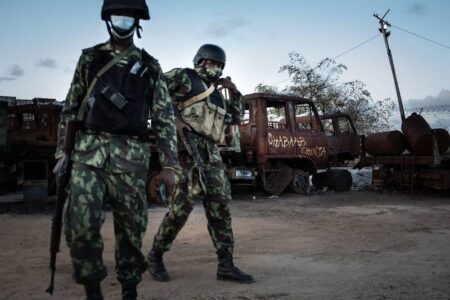
Islamic State terrorist group tightens grip on Mozambique by training new generation of suicide attackers
ISIS’s global expansion into northern Mozambique includes training for a terror offensive involving suicide bomb tactics among a new generation of recruits, one of Africa’s leading intelligence analysts has said.
The southern Africa-based groupings have withstood counter offensives to regain territory and with a bounce from developments in Afghanistan, are training in sophisticated bombing techniques by foreign fighters.
With input from Middle East focused “ISIS central” the Mozambique commanders’ strategic thinking has changed from the idea of establishing a defacto state to hijacking local insurgencies, indoctrinating the population and radicalising them, Jasmine Opperman told The National.
The insurgency in Mozambique has already shown its resilience – just as the European Union training mission was launched this month ISIS hit back with a string of attacks.
In seven significant assaults it has killed at least 14 Mozambique government forces and beheaded two alleged spies, all in the northern Cabo Delgado region.
The insurgency came to international attention in March when a force of 200 fighters seized the town of Palma and killed Westerners working at Total’s $20 billion liquid natural gas development.
Since then very few foreigners have returned but, according to Ms Opperman, whose intelligence is drawn from open sources and contacts, ISIS has grown stronger.
“We are now looking at a force of 2,000-plus insurgents and its main leaders have not been touched, just falling back into areas where they lie low, buying time,” she said.
Small cells are also left behind in towns and villages to fight skirmishes that drain government soldiers’ morale and numbers.
“They are capturing a momentum of presence that is being sustained,” said the former analyst for South Africa’s National Intelligence Agency. “One bullet only will discredit the government’s winning narrative completely.”
Photographs and social media messages on terrorist outlets prove that much of the operations are overseen and encouraged by ISIS central. “We are looking at now over 60 claims to credit and only one I could not link to a specific incident and that speaks directly to a communication line that is running,” Ms Opperman said. “This is all part of ISIS global expansion. We are seeing this in Uganda, Central African Republic, the DRC and of course the Sahel.”
The majority of fighters are local and despite the rainy season, unlike government forces, they can move easily through the dense bush along overgrown tracks, which even drones cannot penetrate.
More worryingly it now appears that training is escalating, conducted by veterans from other ISIS war zones.
The “intense training” taking place in Cabo Delgado “definitely has foreign influence at hand”, Ms Opperman told The National. “You can easily spot who is not a Mozambican, that they come from some way up in Africa. And do we have people from the Middle East? It would not surprise me.”
Tactics have evolved with the fighters learning how to create roadside bombs and now developing suicide vests and car bombs. “We are about to enter a more classic phase of terrorism that has started with the IED [improvised explosive device] attacks against the 2,000 Rwandan troops here and others when there were never IED attacks before.”
She said it was only a matter of time before suicide attacks were launched. “ISIS have simply been given too much room to rest, recuperate, build and recover. They’ve also had religious ideological lessons for young boys and woman, so their extremist ideology is getting stronger and stronger.”
The barbaric executions are also a clear ISIS tactic designed to send a message to the population and spread fear among soldiers.
Ms Opperman said southern Africa was relatively new to ISIS and its ideological approach to ensure it becomes embedded in Mozambique.
“This has now gone way beyond the caliphate,” she said. “For them it’s an evolutionary process where time has a different meaning. Counter-insurgency forces always run against the clock so we need to understand ISIS in their global expansion strategy.”
The new European Union contingent, which hopes to train 1,000 Mozambique soldiers to act as a rapid reaction force, ends in two years.
The terrorists are currently planted in Cabo Delgado where they “can flourish and their extremist narrative can take hold expand further”, making removing ISIS from Mozambique very challenging.
“Sadly, we’ve from seen from Afghanistan, the war on terror, the endless deployments, it’s too late for the barrel of the gun to hold back that ideology,” Ms Opperman said.
Source: The National News





